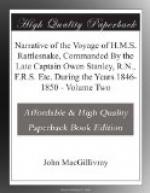October 17 and 18.
Our travelling was very uneven, our horses giving us continual trouble from their frequent falls; we had a few narrow belts of scrub to cut through, but they were not very thick.
October 19.
Several of our horses were now quite unable to carry anything but the saddle; we passed through open forest land, with a light soil, sub-soil clay, with isolated blocks of granite rock scattered about. We encamped by a rocky creek, with water in holes only; it ran westerly, and had fresh green feed on each side, the grass having been burned shortly before, and now growing up again.
October 20.
We passed over a piece of stiff ground about two miles in extent, which appeared to have been the scene of a devastating hurricane. It was covered with fallen timber, which rendered it very difficult to cross. The wind must have swept from the south-west to the north-east, and from the appearance of the saplings which were growing from the stumps of some of the trees which had been broken, this terrific storm appeared to have taken place about two years ago. Not a tree had been left standing in the part where we crossed, nor could we tell how far the devastation had extended to the south-west; but the ground to the north and east being swampy, and covered only with small Melaleucas and Banksias, the wind had not taken much effect. Many of the trees in the middle of the fallen timber measured two feet in diameter. Some were torn up by the roots, and the trunks of others were snapped off at various heights from the ground. The latitude of our camp here was 13 degrees 35 minutes South.
October 21.
We killed another of our horses to-day, as he was too weak to stand.
October 22.
We got our meat well dried to-day, and having smoked it a little, packed it as before. Our stock of flour was now reduced to two hundred pounds weight, and many of the men growing very weak, we were obliged to increase our weekly ration a little. Three of the party, Douglas, Taylor, and Costigan, were suffering from diarrhoea, in consequence of having eaten too freely of the pandanus fruit. Their spirits began to fail them, and they frequently complained despairingly to Mr. Kennedy that they should never be able to reach Cape York. Although our horses were so very weak, these men were obliged to ride, being quite unable to walk far at a time. The country before us was very mountainous, but between the hills we found plenty of grass and water: to the south the whole country appeared to be on fire.
October 23 to 25.
We travelled during these days over a rocky mountainous country, interspersed with deep gullies and creeks, fringed with belts of scrub. In these scrubs I saw the white-apple and the crimson scitamineous plant seen near Rockingham Bay; scattered over the country were a few cedar trees and Moreton Bay chestnuts, and some very fine timber trees belonging to the natural order Myrtaceae, upwards of sixty feet high, and three to four feet in diameter, with fine straight trunks.




